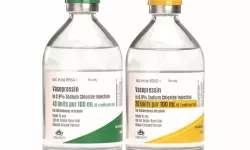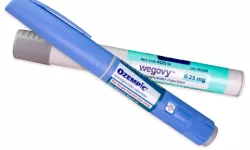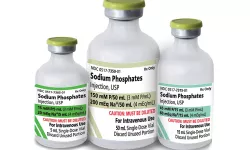Industry News

BOSTON, MA — A new partnership between Boston-based Clearway Health, a company partnering with hospitals and health systems to build and strengthen specialty pharmacy programs and Baptist Health, a full-spectrum health system with nine acute care hospitals headquartered in Louisville, Kentucky, was formalized to improve access to payor networks. Entryway into payor networks will aim to improve availability of prescription medications at more affordable prices.
Baptist Health opened a new centralized pharmacy for its healthcare system in June. The partnership with Clearway Health will break down barriers to allow the entire health system, which has 11 existing retail pharmacies across the system, as well as the new central fill pharmacy to unlock opportunities often inaccessible to local or regional hospitals, including access to medications with payor lockouts.
The improved pathway to these medications at more affordable prices will help to reduce care fragmentation by allowing the clinical team to manage the care of more of their patients across the continuum, including their medications and supplies. The health system's improved financial margin will help provide additional and much needed healthcare services to patients and the local community.
"Baptist Health is transforming specialty pharmacy services --not only for our health system, but for hospitals across the country in setting a new industry standard," said Nilesh Desai, MBA, BS, RPh, CPPS, chief pharmacy officer at Baptist Health. "Having an expert partner like Clearway Health to navigate challenging payor networks is a tremendous advantage for our program's growth. In just one year, this work will generate nearly $100M in incremental revenue that will allow Baptist Health to continue to provide essential healthcare services for the communities it serves."
To help hospitals and health systems gain access to life-saving medications for their patients and keep patient care integrated, optimizing relationships with payors is crucial to the success of a specialty pharmacy program and helps to lower costs for all parties involved including the patients, health system and payors.
"Clearway Health supports health systems at every point of their pharmacy and specialty pharmacy journey," said Allison Arant, senior vice president, client development and marketing, Clearway Health. "We're honored to serve as Baptist Health's partner as they launch the fast-tracked expansion of their program. In the first 30 days of our partnership, we unlocked access to the first payor and look forward to continued growth and success together."

MINNEAPOLIS and ST. PAUL, MN — Myogenica, a University of Minnesota startup company, announced U.S. Food and Drug Administration approval for an Investigational New Drug application for MyoPAXon — an induced pluripotent stem cell-derived muscle stem cell product to regenerate skeletal muscle. A pending clinical trial would evaluate the safety, tolerability and engraftment of MyoPAXon in patients with Duchenne muscular dystrophy (DMD).
Dr. Peter Kang, a pediatric neuromuscular neurologist and director of the Greg Marzolf Jr. Muscular Dystrophy Center at the University of Minnesota Medical School, would lead the proposed early-stage clinical trial. Kang and the clinical research team plan to administer intra-muscular injections of MyoPAXon in non-ambulatory adult DMD patients and monitor any potential site reactions or immune response and assess for the presence of dystrophin-producing myofibers.
"We believe stem cells have enormous potential as a tool for muscle regeneration in muscular dystrophy and the timing is perfect to move toward a human clinical trial of this type of therapy in Duchenne muscular dystrophy," said Kang.
If the proposed trial provides positive outcomes, the team will plan on initiating a mid-stage study targeting other muscles and evaluating muscle function. Because MyoPAXon is not specific for any genetic mutation, it has potential use as a treatment for a range of other muscular dystrophies, as well as other muscle degenerative conditions.
"After many years of basic and preclinical work, we are thrilled to finally have the FDA approve an IND application for an iPSC-derived myogenic cell product. This has been a tour de force and we are excited with what the future holds," said Perlingeiro.

A recent multi-institutional study has uncovered troubling trends in opioid prescriptions for young patients undergoing surgery, with 1 in 6 youths filling an opioid prescription prior to their procedure. Even more concerning, 3% of these patients continue to fill opioid prescriptions three to six months after surgery, indicating potential opioid dependence. The study, which includes researchers from Children’s Hospital of Philadelphia (CHOP), Massachusetts General Hospital, University of Pennsylvania Perelman School of Medicine, and Stanford Medicine, highlights the urgent need for better guidelines to prevent unnecessary opioid prescriptions and to identify patients at risk for persistent use. The findings were published in the journal JAMA Network Open.
Each year, approximately 1.4 million youths undergo surgery in the United States. These patients are particularly vulnerable to opioid-related harms. Despite efforts to reduce opioid prescriptions, clinicians must be vigilant about the risk of addiction in adolescent patients, who may be susceptible due to genetic, neurobiological, and social factors. Previously, there was limited knowledge about the risks of persistent opioid use among adolescents and the timing of initial and refill prescriptions.
"While prior analyses have shown a decline in opioid prescriptions in general, following surgical opioid prescribing recommendations remains a critical issue, especially for adolescents who are more inclined to engage in risk-taking behavior," said Dr. Tori N. Sutherland, the study’s first author and an attending anesthesiologist at CHOP. "Our study found that these patients are still filling prescriptions that are either not recommended or are in excess of what they may need. They are also filling prescriptions up to two weeks before surgeries not associated with severe pre-operative pain, putting young patients at risk for developing persistent use throughout their lives as they transition into adulthood."
The study analyzed data from a national insurance database of privately insured patients aged 11 to 20 who underwent 22 different surgical procedures, either common or associated with severe postoperative pain requiring opioids. None of these patients had taken opioids prior to their surgeries.
Out of over 100,000 patients, 46,951 (46.9%) filled an opioid prescription, with 7,587 (16.2%) of these prescriptions filled up to two weeks prior to surgery for procedures unlikely to cause severe preoperative pain. Furthermore, 6,467 (13.8%) patients filled a second opioid prescription, and 1,216 (3.0%) continued to fill prescriptions between 91- and 180-days post-surgery.
One key finding was that severe pain following surgery was not linked to persistent opioid use. Instead, patients with pre-existing chronic pain, who typically underwent procedures associated with mild or moderate pain manageable with non-opioid medications, were more likely to develop persistent opioid use.
"We believe this study underscores the need for establishing a standard of care for patients who undergo these procedures," said Dr. Scott Hadland, the study’s senior author and Chief of Adolescent and Young Adult Medicine at Mass General for Children and Associate Professor of Pediatrics at Harvard Medical School. "Effective pain management is critical and sometimes requires opioids, but clinicians also need to ensure they are not further contributing to the opioid addiction crisis, particularly with young patients."
Source: Children’s Hospital of Philadelphia (CHOP), news release, July 11, 2024

ROSEMONT, IL — Long Grove Pharmaceuticals announced today it received FDA approval of Premix Vasopressin in its most commonly used concentrations.
The company will offer the following concentrations in early Fall 2024:
- 20 units/100 mL (0.2 units/mL) in 0.9% sodium chloride
- 40 units/100 mL (0.4 units/mL) in 0.9% sodium chloride
“We’re focusing on the areas of greatest need in critical care, and the FDA approval of Premix Vasopressin demonstrates this commitment. Our extensive hospital pharmacy and pharmaceutical industry experience enables us to develop differentiated pharmaceuticals designed to specifically meet our customers’ and patients’ greatest areas of need,” said Peter Karas, Chief Commercial Officer at Long Grove Pharmaceuticals.
Vasopressin in Sodium Chloride Injection is generally used to increase blood pressure when other measures have failed for patients in critical hypotensive shock. Hospital pharmacies throughout the U.S. have a critical need for premix vasopressin with a long shelf life. Long Grove’s new offering will provide immediate value to hospital pharmacies and their patients.
Long Grove Pharmaceuticals introduced its first product to customers in 2022. The company is improving the generic supply chain by developing complex formulations, addressing manufacturing challenges, and achieving regulatory approvals in difficult environments.
“We believe that collaborative and reliable partnerships with manufacturers, developers, suppliers, and customers are essential for sustaining a healthy drug supply chain,” explained Mr. Karas.

Widely available over-the-counter nasal sprays could help fend off upper respiratory tract infections such as colds, chest infections, flu, sore throat, and sinus infections, preventing the onset of severe symptoms. One of the largest trials to date, involving nearly 14,000 adults, has found these sprays can reduce the duration of illness by about 20 percent. They also decrease the number of days with severe symptoms, reduce time off work or normal activities, and lessen antibiotic use.
The study, led by the University of Southampton in collaboration with the University of Bristol and funded by the National Institute for Health and Care Research (NIHR), was published July 12, 2024, in The Lancet Respiratory Medicine.
Recent evidence suggests that using nasal sprays to wash out viruses from the nose and throat or enhancing immune function through increased exercise and stress management can reduce the frequency and severity of respiratory infections. To investigate further, researchers conducted a large-scale randomized trial comparing the effectiveness of two different types of nasal spray and an online resource offering advice on physical activity and stress management.
The study recruited 13,799 adult patients from 332 general practice clinics. All participants had an existing health issue or risk factor for infection, and/or a history of recurrent respiratory infections. Patients were randomized to receive one of three interventions: a Vicks First Defense gel-based nasal spray, which uses a microgel to trap and neutralize viruses in the nose; a saline liquid-based nasal spray, which reduces virus levels in the nasopharynx; or access to an online resource promoting physical activity and stress management.
All three interventions reduced antibiotic use by more than 25 percent and decreased the number of days with severe symptoms. Despite participants not using the sprays as frequently as instructed, both sprays reduced the overall duration of illness by around 20 percent and led to a 20-30 percent reduction in days lost from work or normal activities.
In comparison, the online advice on physical activity and stress management yielded a modest five percent reduction in infection incidence. However, this cost-effective option could have a significant population-level impact due to its ease of distribution.
Paul Little, Professor in Primary Care Research at the University of Southampton, who led the trial, stated, "Our results show nasal sprays are effective in reducing the duration and severity of respiratory infections and minimizing interference with normal activities. This is particularly important given the UK's regular winter infection surges. The reduction in antibiotic use is also crucial in combating antibiotic resistance, a major public health threat."
"Given these results, we advise those at higher risk of infections or those with recurrent infections to use a nasal spray at the first sign of cough, sore throat, cold, or flu-like symptoms to prevent full development. Sprays should also be used preventatively after close exposure to infected individuals," Little added.

EAGAN, MN — Prime Therapeutics LLC/Magellan Rx Management, LLC released a new analysis of real-world integrated pharmacy and medical claims data, which shows 85 percent of individuals who newly started glucagon-like peptide-1 (GLP-1) agonist drugs for weight loss were no longer taking the drug after two years. This analysis is a follow-up to research presented by Prime/MRx in 2023, which found that 71 percent of individuals were no longer taking these drugs for weight loss at one year, representing a further 14 percent point decrease in persistence in just one year.
"Prime/MRx has been at the forefront of GLP-1 insights since we released our year-one research, and though we continue to see declines in persistence and adherence, we are committed to providing clients with actionable data and insights that can steer positive health outcomes for individuals," said David Lassen, PharmD, chief clinical officer at Prime/MRx. "GLP-1s are unlikely to deliver therapeutic value when so many individuals stop treatment after two years, but the findings also illustrate the need for obesity care management programs to improve adherence."
While real-world data is central to discussions about affordability and access, especially as the popularity of GLP-1 drugs for weight loss continues to climb, so too are comprehensive management strategies.
- KeepWell is Prime/MRx's solution designed for their members with a comprehensive, caring approach to manage cardiometabolic health, which supports sleep, nutrition, exercise, diabetes prevention and drug strategy to support better health outcomes.
- Prime/MRx's suite of offerings — including intervention programs, such as HighTouch Rx, utilization/formulary management and investigation resources to monitor potential fraud, waste and abuse — supports members to achieve intended health outcomes.
The recent research also found that although persistence among the 45 percent of the population using weekly-dosed semaglutide (Ozempic and Wegovy) was somewhat better, still only 1 in 4 of those initiating semaglutide treatment for obesity remained on GLP-1 therapy at two years. This also represents a 17-point decrease in weekly dosed semaglutide persistence from one year ago.
Additionally, it was found that at two years 26 percent of individuals switched GLP-1 drugs during therapy — an increase from 11 percent at one year. Eighty-one percent of individuals in the study identified as women.
"A significant number of individuals in this study switched GLP-1 drugs, and we will continue to assess the cause and monitor the impact of switching products over time," said Lassen. "Prime/MRx is committed to using our real-world research to help our clients make informed benefit decisions for GLP-1 coverage as they navigate this dynamic landscape."

ALEXANDRIA, VA — Bluesight, The Medication Intelligence Company, released its 2024 Diversion Trends Report, a comprehensive review of the impact of monitoring, prevention, and identification of controlled substance diversion in healthcare settings. Examining data across controlled substance transactions from January 2022 through December 2023, this report provides healthcare providers with critical insights to drive operational improvements and enhance patient safety.
Key highlights from the report include:
- Diversion Investigations are being closed 37 days sooner on average: a sign of enhanced workflows and more efficient evidence collection.
- Waste events, which can be a risk factor for diversion, added up to over 16 million wasted packages or approximately $38 million in lost costs.
- Top departments involved in variances include nursing (77.7%), anesthesiology (11.8%) and pharmacy (5%).
- Fentanyl (24%) is the top drug associated with variances, followed by Midazolam (15%), and Hydromorphone (10%).
- Discrepancies in controlled substance orders, administrations, wastes, or returns per hospital per quarter decreased by nearly 24% since 2022, enabling hospitals to better prioritize their diversion detection efforts.
- Half of transaction variances were flagged due to incorrect documentation, meaning there was mischarting or a discrepancy that reflected the wrong patient, drug, or dosage.
The report found that diversion monitoring efforts are improving, with fewer discrepant transactions (from 8% to 7%) and more efficient investigations. At the beginning of 2022, investigations were taking an average of 84 days to close. As of December 2023, they are being resolved 37 days sooner, averaging 47 days. Outside of this report, this trend continues into 2024 with investigations averaging only 38 days as of March 2024. This consistent decline indicates enhanced workflows and more efficient evidence collection, supported by increased staff resources for diversion as noted in the 2023-2024 Hospital Pharmacy Operations Report. The report also highlights risks for diversion, such as waste events of over 16 million wasted packages – nearly a quarter of which were Fentanyl packages, correlating with Fentanyl being the drug with the most discrepancies as well. Other patterns illustrated in the report include the top categories, drugs, settings, and staff roles associated with suspected and confirmed diversion.
"The challenge of drug diversion is an issue for all healthcare facilities, requiring a mix of consistent monitoring supported by technology and tools to help our healthcare workers effectively do their jobs. This report is a positive reminder of the impact that new systems can have in helping to tackle this problem. However, there is still more work to be done in this area," said Kevin MacDonald, Bluesight CEO, and co-founder. "By leveraging advanced data integration and comprehensive monitoring technology, such as ControlCheck, we are setting new standards. With our commitment to continued innovation and enhanced patient safety, we support over 850 hospitals in the critical mission to improve compliance, reduce costs and track high-risk drugs and individuals."
Report Methodology
The report examined data from Bluesight's ControlCheck product from January 2022 through December 2023, analyzing over 127M controlled substance transactions at 794 hospitals and health systems across the United States. During this period, the dataset increased from 354 hospitals to 794. The growth of total hospitals included in this analysis contributes to the growth of certain figures such as an increase in variances per quarter, investigations per quarter, and confirmed diversion per quarter.

SHIRLEY, NY — American Regent announces the launch and availability of Sodium Phosphates Injection, USP, which is FDA-approved and therapeutically equivalent to Sodium Phosphates.1 Sodium Phosphates Injection, USP 3 mM P/mL is indicated as a source of phosphorus, for addition to large volume intravenous fluids, to prevent or correct hypophosphatemia in patients with restricted or no oral intake. It is also useful as an additive for preparing specific parenteral fluid formulas when the needs of the patient cannot be met by standard electrolyte or nutrient solutions.
The concomitant amount of sodium (Na+ 4 mEq/mL) must be calculated into total electrolyte dose of such prepared solutions.
Sodium phosphate is contraindicated in diseases where high phosphorus or low calcium levels may be encountered, and in patients with hypernatremia.
"An important part of our company's mission is to assist in mitigating shortages and ensuring supply of critical medications whenever possible. To that end, we are pleased to add Sodium Phosphates Injection, USP to our robust line of products that are formulated, filled, and finished at our US-based manufacturing facilities," stated Joann Gioia, Vice President and Chief Commercial Officer at American Regent, Inc.
This product is available for immediate shipment.
See the following Important Safety Information, in addition to the product's Full Prescribing Information.

GUILDFORD, UK and DURHAM, NC — MedPharm, a global topical and transdermal Contract Development and Manufacturing Organization (CDMO) and Ampersand Capital Partners portfolio company, announced a merger with Tergus Pharma, a Great Point Partners portfolio company. The combined organization will operate under the MedPharm name, establishing a leading, end-to-end CDMO with robust scientific, clinical trial manufacturing and commercial production capabilities. As part of this transaction, Tergus Pharma CEO Michael Kane has been appointed CEO of MedPharm while Patrick Walsh will continue to serve as Executive Chairman of MedPharm.
The merged business is well-positioned as a global leader in delivering a full suite of drug development and manufacturing services to innovators of all sizes focused on advancing topical and transepithelial pharmaceuticals. The strategic combination of Tergus and MedPharm's capabilities enables commercial production and serialization to existing formulation development, in vitro testing and clinical manufacturing within one integrated organization. Expanded capabilities will also include the development and manufacture of hormone-based and highly potent drugs at the Company's GMP manufacturing facility in Durham, NC.
Michael Kane commented, "This strategic partnership is an exciting opportunity to deliver extensive pharmaceutical product development resources fueled by a robust team of scientific experts while leveraging our cutting-edge topical GMP facility to seamlessly meet our customers' commercial production needs. With locations in both the United Kingdom and the United States, we are well positioned to provide exceptional support to our existing and prospective pharmaceutical clients."
MedPharm Executive Chairman Patrick Walsh added "Pharma clients have been seeking a reliable, integrated service offering for their ophthalmic, topical and transdermal development and manufacturing projects. This merger creates an immediate option with two organizations already well-positioned in the industry."
Tergus lead investor Great Point Partners will retain a significant minority ownership stake in the newly combined MedPharm, while private equity firms Ampersand Capital Partners and Bourne Partners Strategic Capital assume majority ownership.

INDIANAPOLIS, IN — The U.S. Food and Drug Administration (FDA) approved Kisunla™ (donanemab-azbt, 350 mg/20 mL once-monthly injection for IV infusion), Eli Lilly and Company's Alzheimer's treatment for adults with early symptomatic Alzheimer's disease (AD), which includes people with mild cognitive impairment (MCI) as well as people with the mild dementia stage of AD, with confirmed amyloid pathology. Once-monthly Kisunla is the first and only amyloid plaque-targeting therapy with evidence to support stopping therapy when amyloid plaques are removed, which can result in lower treatment costs and fewer infusions.
"Kisunla demonstrated very meaningful results for people with early symptomatic Alzheimer's disease, who urgently need effective treatment options. We know these medicines have the greatest potential benefit when people are treated earlier in their disease, and we are working hard in partnership with others to improve detection and diagnosis," said Anne White, executive vice president and president of Lilly Neuroscience, Eli Lilly and Company. "Our deepest thanks to the patients and their loved ones for participating in our clinical programs and to Lilly scientists and collaborators persevering over decades of research. Each year, more and more people are at risk for this disease, and we are determined to make life better for them."
Amyloid is a protein produced naturally in the body that can clump together to create amyloid plaques. The excessive buildup of amyloid plaques in the brain may lead to memory and thinking issues associated with Alzheimer's disease. Kisunla can help the body remove the excessive buildup of amyloid plaques and slow the decline that may diminish people's ability to remember new information, important dates, and appointments; plan and organize; make meals; use household appliances; manage finances; and be left alone.
In the TRAILBLAZER-ALZ 2 Phase 3 study, people who were the least advanced in the disease experienced the strongest results with Kisunla. Trial participants were analyzed over 18 months in two groupings: one group who was less advanced in their disease (those with low to medium levels of tau protein) and the overall population, which also included participants with high tau levels. Treatment with Kisunla significantly slowed clinical decline in both groups. Those individuals treated with Kisunla who were less advanced in their disease showed a significant slowing of decline of 35% compared with placebo on the integrated Alzheimer's Disease Rating Scale (iADRS), which measures memory, thinking, and daily functioning. In the overall population, the response to treatment was also statistically significant using the iADRS at 22%. Among the two groups analyzed, participants treated with Kisunla had up to a 39% lower risk of progressing to the next clinical stage of disease than those taking placebo.
Among the overall population of participants, Kisunla reduced amyloid plaques on average by 61% at 6 months, 80% at 12 months, and 84% at 18 months compared to the start of the study. One of the treatment goals of the study was to remove amyloid plaques to minimal levels consistent with a visually negative scan using amyloid positron emission tomography (PET). If participants were confirmed to have reached these levels, they were able to complete treatment with Kisunla and switch to placebo for the remainder of the study.
Kisunla can cause amyloid-related imaging abnormalities (ARIA), which is a potential side effect with amyloid plaque-targeting therapies that does not usually cause symptoms. It can be detected via magnetic resonance imaging (MRI) scans and, when it does occur, may present as temporary swelling in an area or areas of the brain, which usually resolves over time, or as small spots of bleeding in or on the surface of the brain. Infrequently, larger areas of bleeding in the brain can occur. ARIA can be serious, and life-threatening events can occur. Kisunla can also cause certain types of allergic reactions, some of which may be serious and life-threatening, that typically occur during infusion or within 30 minutes post-infusion. Headache is another commonly reported side effect. See the Indication and Safety Summary with Warnings below for additional information.
"This approval marks another step forward in evolving the standard of care for people living with Alzheimer's disease that will ultimately include an arsenal of novel treatments, providing much needed hope to the Alzheimer's community. As a physician, I am encouraged by the potential to stop treatment, which could reduce out-of-pocket costs and infusion burden for eligible patients," said Howard Fillit, M.D., Co-Founder and Chief Science Officer at the Alzheimer's Drug Discovery Foundation (ADDF). "Diagnosing and treating Alzheimer's sooner than we do today has the potential to meaningfully slow disease progression, giving patients invaluable time to maintain their independence for longer."
Cost and Coverage
In the TRAILBLAZER-ALZ 2 trial, people were able to complete treatment and switch to placebo at 6, 12, or 18 months after they achieved one of the study's treatment goals, minimal levels of amyloid plaque consistent with a visually negative amyloid PET scan. In the overall population of people receiving Kisunla, 17% completed treatment at 6 months, 47% at 12 months, and 69% at 18 months based on an assessment of amyloid levels via an amyloid PET scan.
The total cost of Kisunla will vary by patient based on when they complete treatment. The FDA's dosing instructions state that prescribers can consider stopping the dosing of Kisunla based on removal of amyloid plaques to minimal levels as observed on amyloid PET imaging. The potential to complete treatment after a limited-duration course of therapy, along with 30-minute infusions once per month, could result in lower patient out-of-pocket treatment costs and fewer infusions compared to other amyloid-targeting therapies.
Patients' out-of-pocket cost for treatment with Kisunla will depend on their length of treatment and their insurance. Coverage and reimbursement for Kisunla are now available for eligible patients on Medicare under a National Coverage Determination with Coverage with Evidence Development. Also, as of October 2023, broad coverage and reimbursement for amyloid PET scans are available for eligible patients on Medicare. More than 98% of eligible Medicare patients have coverage that eliminates, limits, or caps their annual out-of-pocket exposure.
Lilly Support ServicesLilly Support Services for Kisunla is a free support program committed to helping patients navigate treatment with Kisunla. The program includes offerings such as coverage determination assistance, care coordination, nurse navigator support, and customized support and resources. For more information about Lilly Support Services and Kisunla, visit www.Kisunla.Lilly.com or call 1-800-LillyRx (1-800-545-5979).